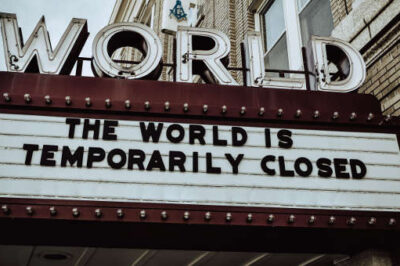It’s during times like we are seeing with the coronavirus that Christians should be thinking, living and responding differently. What does the Bible say about how we should think and act during times that are bigger than an individual, bigger than any nation and, yes, bigger than the world?
There are a number of things that this challenge should cause us to remember:
- We should remember that everyone will one day die. People are fearful of this virus. And non-Christians should be fearful of death. But for the believer, we should have no fear of death. Whereas all mankind is born once physically, all mankind will die once physically. However, for the believer, we are born twice—once physically and once spiritually. But we die just once. The unbeliever is born once but will die twice, physically and spiritually, eternally separated from God in punishment. Luke 13:4-5 gives the account of the tower of Siloam that fell and many died.
Jesus was asked if those who died were guilty of some sin. Jesus did not answer that question, but said that we all should repent. Interestingly, the reality of death is clear. It will come to all of us. The point is, are we ready today? Have we repented? The other principle is that the Bible tells us that we can’t add a single hour to our lifespan. So the lesson is, don’t try. We should, of course, take care of our bodies and do our best, but there is an appointed time for all of us today. As Christians, we shouldn’t fear death but should focus on helping others who should have a fear of death.
- We should remember that this earth and America is not our permanent home. We are but pilgrims passing through, citizens of our heavenly kingdom. James 4:14 instructs us that our life is as a mist. We must be careful of not becoming too comfortable in this world. In Hebrews 11:10, there are those who were commended for their faith and were looking forward to heaven like Abraham. Hebrews 13:13-14 says we have no lasting city here. We’re heading on our way to our true home. As all signs point to indications of the days prior to the return of Christ, we must, as an indication of our true faith, be anticipating and ready for the Lord’s return.
- We should remember to not be concerned about storing up earthly treasures that moths and rust can so easily destroy. In Matthew 6:19-21, Scripture tells us we are to store up treasure in heaven, not here on Earth. Where our treasure is, there our heart will be. It’s easy to become attached to what is here. When we look around and see how, in a matter of weeks, trillions of dollars of wealth just vaporized, people who weren’t sick last week are now dead and a booming economy that is the envy of the world can be moving to great recession—all of these things should remind us to ask: Where is our treasure? Where is our heart?
- We should remember that God tells us to live day by day and remember His promise that He will provide all of our needs. In Matthew 14, we have the example of Peter, who was told not to look at the storm around him, but to keep his eyes on the Lord. We have an economic storm, we have a health storm and we may have other storms. But we must keep our eyes on Christ. And in Philippians 4:19, we were told that God will provide. In Matthew 6:25-33, we are also reminded not to be anxious for anything or concerned about what we will eat or wear.
- We should remember that we must redeem the time. Ephesians 5:16 tells us to make the best use of our time, so let’s not spend our time fretting and worrying, but focusing on our task at hand, as sons and daughters of God and ambassadors of Jesus Christ. We’re on a mission, and may this time be used to focus our real mission as citizens of a heavenly kingdom.
- We should remember that God has the right to bring judgment or blessing to any nation and to the world according to His pleasure. Isaiah 45:7 tells us that God creates blessing; He brings calamity, He brings blessings and He brings judgment. Who are we to question what God chooses to do? But also remember that when things like this happen, our God is a sovereign God, and His ways are above our ways. Instead of fearing or complaining, we should ask this question:
What is God trying to teach us individually, as a family and as a nation? In Jeremiah 18:3-6, we have the example of the potter and the clay. Do we have any right to say to the potter that He doesn’t know what He is doing or doing what is bad for us? God knows exactly what He’s doing. And God is in control. Regardless of what President Trump or Nancy Pelosi or Bill Gates or anyone else thinks, they can do nothing that will work unless God permits it. Likewise, there’s nothing they can do to stop what God intends to do. We must at these times put the pleasure of our great God ahead of our convenience.
- We should remember that by faith we must be confident in God’s provision and view the challenge as an opportunity to go forward, not as a reason to retreat. In Numbers 13:26-14:7, we see the story of the 12 spies sent into the land to investigate. Only Joshua and Caleb came back and said, “Oh yes, there are giants, but we can take them. Let’s go!” The others were fearful and were more concerned about the circumstances than the promises of God. The same example applies to David and Goliath. Saul and the Israelites feared Goliath, but David feared God more.
We are told in 2 Timothy 1:7 not to be overcome with the fear of the world, for God has not given us a spirit of fear but of power, love and a sound mind. We are not to fear the people of the land. We are not to fear what we don’t understand. In Genesis 22:1-2, God told Abraham to sacrifice his son. Even though he did not understand how, Abraham moved ahead. Ultimately, Isaac was spared, but later in the Bible in James, Abraham is referred to as a friend of God because of his great faith and because he did not question God. Similarly, Shadrach, Meshach and Abednego faced being singled out and threatened with death. Did they fear God more than government, the king or death?
Then in Hebrews 11:35-38, we have the account of people being persecuted for their faith. Some were cut asunder, some were beheaded, some were stoned to death and others wandered about. We are not in any of those circumstances yet. However, God said about these people that the world was not worthy of them, but they were indeed worthy before the Lord. That is the question that we should ask. Can God say that of us?
In the end, we must press on and be diligent, doing what God has told us to do, giving hope to those with no hope, sharing the gospel of Jesus Christ with those who should fear death and remembering that we are but pilgrims traveling through this land—citizens of this blessed nation of ours, but citizens of a heavenly kingdom whose founder and maker is God Himself.
Coming up next is the bridegroom, Jesus Christ, who will come again soon for all those who trust in Him, who have their lamps lit, their wicks trimmed and their oil filled. He is coming soon. Are we anticipating that and living like that? {eoa}
The Hon. Sam Rohrer is president of the American Pastors Network, a national network of pastors with constitutional and biblical teachings that discuss today’s pressing issues. He was a Pennsylvania lawmaker for 18 years and hosts the daily Stand in the Gap Today national radio program on more than 400 stations and is host of the Stand in the Gap national television program.







Leave a Comment
You must be logged in to post a comment.